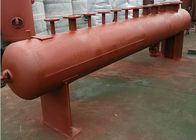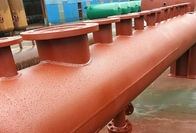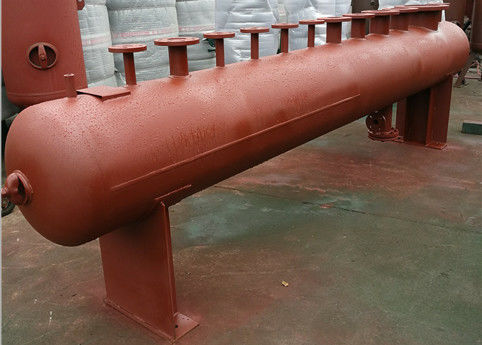1. Corrosion Analysis
Shell and tube heat exchanger materials are generally carbon steel, stainless steel and copper-based, in which carbon steel tube plate as a cooler, the tube and tube pipe welds often appear corrosion leakage, spill into The cooling water system pollutes the environment and causes material waste. Shell and tube heat exchanger in the production, the tube and the tube of the general use of manual arc welding, weld shape there are different degrees of defects, such as depression, pores, slag, etc., the distribution of weld stress is not uniform. When used in the tube part of the general contact with the industrial cooling water, and industrial cooling water impurities, salts, gases, microorganisms will constitute the tube and weld corrosion, which is what we often say electrochemical corrosion. Studies have shown that industrial water, whether fresh or seawater, will have a variety of ions and dissolved oxygen, which chloride ion and oxygen concentration changes, the corrosion of metal plays an important role in the shape. In addition, the complexity of the metal structure will also affect the corrosion pattern. Therefore, the corrosion of the tube plate and the pipe weld is mainly pitting corrosion and crevice corrosion. From the outside, the tube plate surface will have many corrosion products and accumulation of objects, the distribution of the size of the pit. When the sea water as the medium, but also produce galvanic corrosion. Chemical corrosion is the corrosion of the medium, the heat exchanger tube board contact with a variety of chemical media, will be subject to chemical corrosion. In addition, the heat exchanger tube plate and the heat transfer tube will produce a certain degree of bimetallic corrosion.
2. Anti-corrosion protection
In view of the problem of anti-corrosion of cooling tower, the traditional method is mainly based on welding, but the welding is easy to make internal stress inside the tube plate, it is difficult to eliminate, which may cause the weld of the cooling tower tube to leak again. Western countries are more use of polymer composite materials to protect the method. It has excellent adhesion properties and resistance to temperature, chemical resistance, in a closed environment can be safely used without contraction, especially good isolation of bimetallic corrosion and erosion resistance, fundamentally put an end to the repair site of corrosion Leakage, providing a long-lasting protective coating for the cooling tower.
3. Installation
| 1) the heat exchanger should be the maximum working pressure of 1.5 times the water pressure test, the steam part should not be less than the steam supply pressure plus 0.3MPa; hot water should not be less than 0.4MPa. Under the test pressure, keep the pressure for 10 min. |
| 2) shell and tube heat exchanger front end should be left out of the space of the tube, that is, the head of the wall or the roof of the distance shall not be less than the length of the heat exchanger, equipment operating operating channel width should not be less than 0.8m. |
| 3) The installation height of various valves and instruments should be easy to operate and observe. |
| 4) The upper part of the upper part of the heater (generally refers to the safety valve) to the lowest point of the construction structure of the vertical clearance should meet the installation and testing requirements, and shall not be less than 0.2m. |
4. Parameters Control
The main control parameters of shell and tube heat exchanger for the heating area, hot water flow, heat transfer, heat medium parameters.
5. How to Choose
| 1) Determine the required heat transfer area based on the known cold and hot fluid flow rates, primary and final temperatures and the specific heat capacity of the fluid. The initial estimated heat transfer area, generally assumed the heat transfer coefficient, to determine the heat exchanger structure, and then check the heat transfer coefficient K value. |
| 2) Selection of heat exchanger should pay attention to pressure level, the use of temperature, interface connection conditions. In the pressure drop, the installation conditions allow the premise, the shell and tube heat exchanger to choose a small diameter of the lengthened, is conducive to improving the heat transfer. |
| 3) the pressure drop of the heat exchanger should not be too large, generally controlled between 0.01 ~ 0.05MPa; |
| 4) The size of the flow rate should consider the viscosity of the fluid, the viscosity of the flow rate should be less than 0.5 ~ 1.0m / s; general fluid tube flow rate should take 0.4 ~ 1.0m / s; easy to scale the fluid should take 0.8 ~ 1.2m / s. |
| 5) high temperature water into the heat exchanger should be set before the filter. |
| 6) The single treatment and configuration of the heat exchangers in the heat exchange station should meet the requirements of the total heat load and regulation of the heat exchange station. To meet the requirements of the user heat load adjustment under the premise of the same heating coefficient of the number of heat exchangers should not be less than 2, not more than 5 units. |


 Your message must be between 20-3,000 characters!
Your message must be between 20-3,000 characters! Please check your E-mail!
Please check your E-mail!  Your message must be between 20-3,000 characters!
Your message must be between 20-3,000 characters! Please check your E-mail!
Please check your E-mail!


